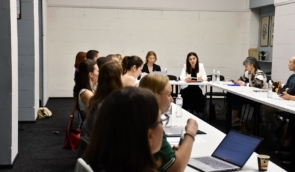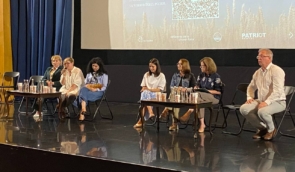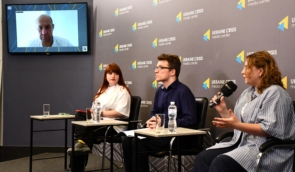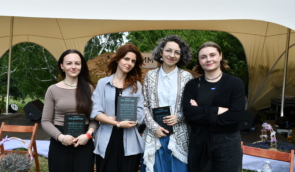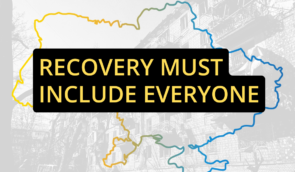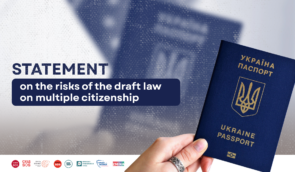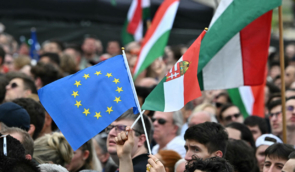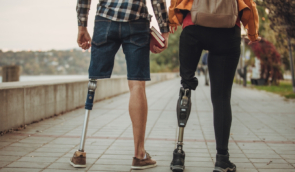We demand justice for Serhii Sternenko: the statement of civil society organizations
On February 23, 2021, Prymorskyi District Court of Odesa found civic activist and blogger Serhii Sternenko as well as Ruslan Demchuk guilty in the case of abduction in 2015 of Serhiy Shcherbych, Member of Kominternivske District Council of Odesa region. They were detained in the courtroom and sent to pre-trial detention center. Each was sentenced to seven years and three months of imprisonment with confiscation of half of their property.
This case caused significant public outcry. Rallies in support of Serhii Sternenko took place in many cities of Ukraine (sometimes with illegal detentions of protesters by the police). It has also exacerbated the lack of public confidence in the judicial and law enforcement systems. They have not been properly reformed since the Revolution of Dignity, which leaves them vulnerable, in particular, to the influence of Russia and pro-Russian forces.
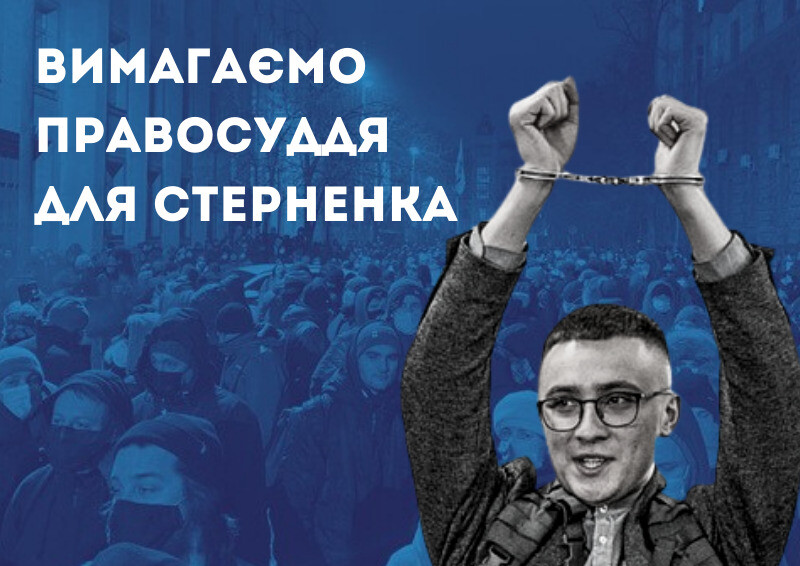
There are serious doubts about fairness of consideration of the case in the context of Serhii Sternenko’s prosecution in the “case of Shcherbych” because of the following:
Independence and impartiality of the court: The case was considered by Prymorskyi District Court of Odesa. According to the opinion of the Public Integrity Council, the judge Viktor Poprevych does not meet the criteria of integrity and professional ethics. In particular, this judge in his previous decisions acquitted drunk drivers and policeman who had tortured people; closed the case regarding drunk driving against the chairman of Odesa District Administrative Court; did not submit in declaration the car and the apartment of his wife in Crimea, etc.
Qualification of the crime: In the “case of Shcherbych” Serhii Sternenko was found guilty in full according to part 2 article 146 (illegal deprivation of liberty or kidnapping), part 2 part 187 (robbery) and part 1 article 263 (illegal handling of weapons, ammunition or explosives) of the Criminal Code of Ukraine. According to published text of the court decision, as well as the publicly stated position of the prosecution, it follows that motive for committing the act incriminated to Sternenko and Demchuk was to put pressure on Member of District Council Serhii Shcherbych to make him step down from the council. At the same time, they were convicted upon part 2 article 187 of the Criminal Code (robbery). The subjective side of this crime is characterized by direct intention and selfish motive, and mandatory feature of the subjective side of robbery is the purpose for which the attack is conducted, namely, seizure of one’s property. The purpose, as can be seen from materials of the case and decision of the court, was different. There is no proper and admissible evidence of robbery in the case, and therefore this article cannot be considered proven. As for another article of the Criminal Code according to which Sternenko and Demchenko were convicted, namely part 2 article 146 (illegal deprivation of liberty or kidnapping), so, the accused were released from punishment due to the expiration of statute of limitations for bringing to responsibility according to this article.
Proportionality of punishment: Serhii Sternenko was sentenced to 7 years and 3 months of imprisonment with confiscation of half of his property. Another subject of the case Ruslan Demchuk received the same sentence. Let’s compare: murderers of public activist from Kherson Kateryna Handziuk, on whom they had poured one liter of sulfuric acid and which led to severe torture and death of the activist, were sentenced from 3 to 6 years of imprisonment. Shcherbych, according to the Prosecutor General’s Office, received minor injuries that caused short-term health disorder, and, according to the investigation, suffered material damage in the amount of 330 UAH (less than 15 euros as of 2015).
Terms of consideration of the case: There are questions and timing of the investigation and trial of the “Shcherbych case”, which has been going on for almost six years (the victim did not appear in court for five years and only in November 2020 Shcherbych finally came to the hearing and gave testimony in court). Under article 146 part 2, the term of prosecution expired, when suddenly in February 2021 the court ruled in this case. This happened alongside possible collapse of another case in the court regarding accusation of Serhii Sternenko of “premeditated murder”, when he fatally hit one of two men who had attacked the activist with cold weapon in 2018, as well as intention of the Prosecutor General’s Office to ensure “notice of suspicion (criminal charges) in any case”.
These facts show that the persecution of Serhii Sternenko (and Ruslan Demchuk) in the “case of Shcherbych” has political motives, and the judiciary didn’t follow principles of independence and impartiality when it considered the case.
During consideration of the “case of Shcherbych’ we should also take into account general context of the persecution of Serhii Sternenko, attacks on the activist, and discrediting campaign by pro-Russian media and figures against him. All this, as well as other episodes and cases illustrated not only obvious inability of law enforcement agencies to investigate attacks on Sternenko and ensure his safety, but even involvement of these bodies in fabricating other politically motivated cases against activist from Odesa.
For instance, in November 2017, police in Odesa prepared a notice of suspicion of “organizing mass riots” to Sternenko, who ran an online stream of protest against construction at Summer Theater of Odesa City Garden, which had taken place on November 17, 2017. The activist didn’t wait for an official summon and went to the investigator on November 24, where he officially received the status of suspect. On the same evening Sternenko was sent to prison with the bail of 600,000 UAH (25,000 USD). But the court of appeal cancelled the decision and released Sternenko on personal bail, and the case was later reclassified from “mass riots” to “hooliganism.” As of 2020, the case was not considered by the court because the victim, former head of the regional police Dmytro Golovin, had ignored court meetings.
In 2018, three physical attacks on Serhii Sternenko were committed in Odesa. On February 7, 2018, the activist was beaten and stabbed. Sternenko asked the police for protection, but he was refused on the grounds that there was no threat. On May 1, 2018, the activist was shot in head with rubber-bullet handgun, but the attackers hit in the neck. After this attack, Sternenko repeatedly asked the police to provide him protection, but the police failed to do this again. The third attack took place on May 24, 2018, during which Sternenko fatally injured one of two attackers, namely Ivan Kuznetsov. After this attack Sternenko twice asked for protection, but the police again refused. Instead, they provided protection to another attacker, Oleksandr Isaykul, who later ran away from Ukraine and is hiding abroad.
As for the first attack on Sternenko, the police did not establish the instigator, performers and other accomplices. And no one faced criminal charges. As for the second attack, the suspicion was announced only to previously convicted Abzal Baymukashev (who was detained at the scene by Sternenko himself); the case has not been considered yet in the court, per se. Except for the performer of the crime, no one faced charges. Oleksander Isaykul and deceased Ivan Kuznetsov were announced as suspects in the third attack on Serhii Sternenko. Their actions were classified as hooliganism committed with the use of weapon or other object adapted to inflict bodily harm. Later, the case against Kuznetsov was closed due to his death. Law enforcement agencies didn’t establish the instigators of these attacks in any of these cases.
Police in Odesa not only failed to take appropriate actions to investigate attacks on Sternenko, but also destroyed and falsified materials of the case. Thus, it turned out that some documents and material evidence were missing in proceedings that had been transferred to Kyiv to the SBU. They were probably stolen or destroyed during the pre-trial investigation by police in Odesa region.
Sternenko himself has repeatedly stated that attacks on him might have involved current and former police officers in Odesa region, and that attacks might be related to his criticism of Odesa Mayor Gennadiy Trukhanov.
In view of the above, we state that serving justice in Sternenko’s cases is impossible without:
- consideration of the case against Sternenko and Demchuk regarding the abduction of Serhii Shcherbych by impartial and unbiased court, including:
– consideration of the case in region other than Odesa;
– consideration of the case taking into account principles of openness and publicity with the possibility for society to have access to arguments presented by parties in the court;
- effective investigation and consideration in the court of other episodes regarding the persecution of Serhii Sternenko, in particular three attacks on the activist in 2018, with the establishment and bringing to responsibility:
– attackers,
– instigators of these crimes,
– law enforcement officers who sabotaged their investigations and fabricated other criminal cases against Sternenko.
- reforming the judiciary by immediate cleansing and reboot of the High Council of Justice with involvement of representatives of public and international experts and guaranteeing their crucial role in the process.
Additionally, in case of the appealling by the defense, we demand to change the measure of restraint to the one that is not related to imprisonment, given that Serhii Sternenko took part in trial and did not evade justice.
The case of Serhii Sternenko is another example of systemic crisis in the judiciary and law enforcement system, the lack of public confidence in court decisions, and the deepening of confrontation between society and police. It puts on the agenda the need to continue initiated reforms, as well as personal political responsibility of heads of the Ministry of Internal Affairs and the Prosecutor General’s Office, who sabotage them.
Human Rights Center ZMINA
DEJURE Foundation
Ukrainian Independent Center for Political Studies
Initiative Center to Support Social Action “Ednannia”
Anti-Corruption Action Center
The “Who is Behind Kateryna Handziuk’s Assault?” Movement
Automaidan
Liberal Democratic League of Ukraine / Free Hong Kong Center
Laboratory of Legislative Initiatives
Media Initiative for Human Rights
NGO “Development of the Azov region”
NGO “OPIR.ORG”
Crimean Human Rights Group
NGO Fulcrum UA
Association of Ukrainian Military, LGBT veterans
Ukrainian Association of War Veterans and Participants in the Anti-Terrorist Operation
If you have found a spelling error, please, notify us by selecting that text and pressing Ctrl+Enter.

